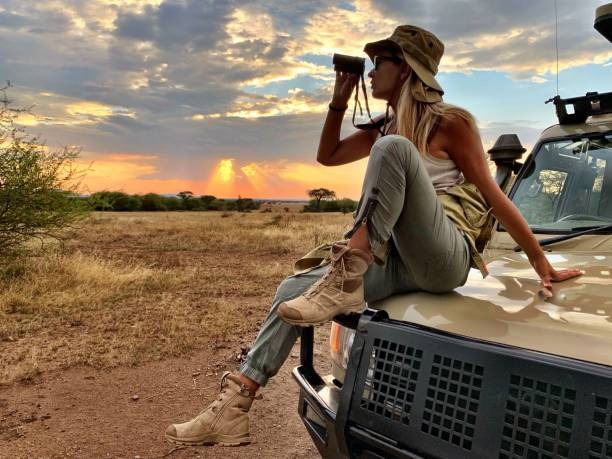Understanding the Essence of Safari Travel
There’s something undeniably thrilling about the prospect of a safari. The very word conjures images of golden savannas, majestic wildlife, and the promise of adventure. Whether it’s the call of the wild or the chance to reconnect with nature, a safari offers you the opportunity to immerse fully in the awe-inspiring beauty of diverse ecosystems. For instance, imagine witnessing a pride of lions lounging under the shade of an acacia tree or spotting a family of elephants crossing the dusty roads of the Serengeti.
However, a truly enriching safari experience goes beyond merely watching wildlife. It’s about understanding and appreciating the delicate balance of nature, respecting wildlife habitats, and embracing the responsibility of being a conscientious traveler. This means recognizing that our presence has an impact and making efforts to minimize our footprint. Traveling with organizations like Luxury Safaris Tanzania ensures that you respect these ecosystems while experiencing the thrill of a lifetime.
Tanzania’s safaris unfold across golden savannas, dense forests, and volcanic craters teeming with life. Elephants roam freely, lions lounge under acacia trees, and hippos splash in muddy waters. Each game drive feels like stepping into a nature documentary.
Ethical Considerations in Safari Adventures
As the world grows increasingly aware of environmental problems, the ethical dimensions of travel are becoming more critical. The ecological concerns surrounding tourism are vast, ranging from carbon footprints to wildlife disturbances. Therefore, it’s crucial to engage in sustainable tourism practices that minimize negative impacts. Participating in these practices is pivotal in protecting the fragile environments that support safari experiences, ensuring the land remains vibrant and thriving for wildlife and human communities alike.
Travelers can assist in conservation by opting for operators committed to protecting wildlife and their habitats. Ethical tour operators often contribute a substantial portion of their earnings to local conservation projects and communities, ensuring a positive impact on the regions they operate in. Learning about their efforts can enhance your appreciation of the importance of balanced and sustainable tourism practices.
Planning an Enriching Safari Experience
To maximize your safari adventure, researching and choosing the right time and destination is essential. Wildlife behavior is heavily influenced by seasonal patterns, so planning your trip around these can greatly enhance your experience. For instance, the dry season in many parts of Africa, typically from June to October, is the best time to view wildlife as animals gather around water sources.
When selecting a tour operator, delve into their commitment to ethical practices. Many ethical operators provide comprehensive details about their environmental policies, including community support initiatives and conservation efforts. Making an informed choice in this area not only contributes to preservation efforts but also enriches your personal travel experience.
Capturing the Safari Moment: Photography Tips
Photography is an integral part of any safari, enabling you to document your experiences and share the majestic beauty with others. For those wanting to capture the splendor of the wild, ensure your equipment is suited to the task. Investing in a zoom lens can be invaluable for capturing distant wildlife without causing disturbance. Additionally, understanding the basics of composition, such as the rule of thirds and focus, can significantly enhance your photos.
Shooting during the golden hours—early morning and late afternoon—can exploit the natural light for truly spectacular images. This time of day often colors the landscapes with rich hues, offering a perfect backdrop for your wildlife photography.
Understanding Wildlife Behavior for Safe Viewing
Respect for wildlife is central to a fulfilling safari. Learning how to read wildlife behavior enables you to interact safely and respectfully. Animals have specific behaviors that indicate their mood or intentions. Understanding these can prevent unwanted encounters and ensure your safety. For instance, if elephants start flapping their ears and trumpeting loudly, it could be a sign of agitation or a warning.
Remember, your presence is a privilege, and maintaining a safe distance is necessary to avoid stress for the animals. Observing these guidelines not only ensures your safety but also enhances the quality of the encounter, allowing a deeper connection with the natural world.
Engaging with Local Communities Respectfully
Your safari isn’t just about nature—it’s also about engaging with the cultures that reside near these extraordinary landscapes. Supporting local economies by buying goods and services from community-based businesses is a practical way to give back. By doing so, you directly contribute to the livelihoods of those who live in these areas and play a role in the conservation efforts.
Furthermore, showing genuine interest in and respect for local cultures can enrich your journey and foster an environment of mutual respect and understanding. Engaging in cultural experiences, such as traditional dances or local cooking classes, provides a unique insight into the lives of those who share the landscape with the wildlife you’ve come to see.
Before embarking on your wildlife adventure, it’s important to keep your travel gear organized and accessible. While packing light is key for a safari, you may need space for other travel essentials. Charlotte self storage units offer a convenient and secure solution. Storing your non-essential items ensures that you’re fully prepared for the adventure ahead without the hassle of excess baggage.



